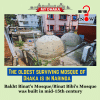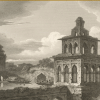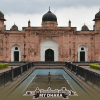Musa Khan's grave: A heritage of the Baro Bhuiyan

Even if you do not know of the son, you have surely heard of his father, Isa Khan, the heroic zamindar and invincible chieftain in Bengal. He was the leader among the band of rulers who were in rebellion against the Mughal forces that sought to conquer the region.
Indeed, Emperor Akbar could never establish his full authority here during the lifetime of Isa Khan, the head of the rulers collectively known as "Baro Bhuiyan" (meaning 12 zamindars/landholders/local chiefs, although historians believe that the number was probably more than 12).
His successor Musa Khan inherited vast areas of Bengal, as well as the responsibility of carrying forward the rebellion against the Mughals. But as history tells us, Musa Khan and the Baro Bhuiyan clan were eventually defeated, making way for the "new" Mughal era.
Musa Khan died of a long illness in April 1623, just around a decade after Dhaka became a Mughal capital.
His grave is in Dhaka. Tucked away from the public eye, the tomb receives little attention. It is situated on the campus of Dhaka University, beside Musa Khan Mosque -- a three-domed Mughal-era mosque which is also worth visiting, although it was most likely not built by Musa Khan himself.
Sources: Banglapedia and Dacca: A Record of its Changing Fortunes by Ahmad Hasan Dani

 For all latest news, follow The Daily Star's Google News channel.
For all latest news, follow The Daily Star's Google News channel. 








Comments